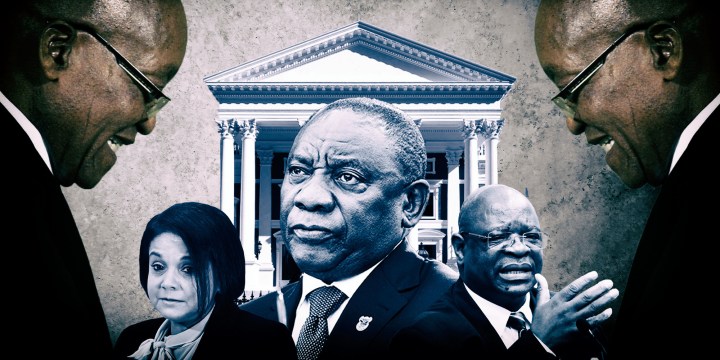OP-ED
Corruption thrives when secret money, not citizens’ voices, determine policy choices

Curbing corruption is intrinsically linked to the influence of big money in politics. Ensuring transparency in party political funding will go a long way in dealing with rampant graft.
Last week, Transparency International (TI) released its annual Corruption Perception Index (CPI) report for 2019. The index focuses on corruption in the public sector, and scores are partly based on the assessments of experts and the perceptions of business leaders.
Several commentators have observed that some representatives of leading private businesses have been active facilitators in state capture and other forms of corruption that inform these very perceptions and weaken our national integrity.
In any event, the result is that South Africa is ranked in 70th position in the 2019 index, with a score of 44. In the 2018 CPI, SA was ranked 73rd with a score of 43. The score is of greater significance than our relative ranking, although, either way, we’re in the modest company of largely authoritarian states of Eastern Europe, such as Hungary, Romania and Bulgaria.
We may speculate as to the reasons for the marginal improvement in our score, but they may relate at least in part to President Cyril Ramaphosa’s administration’s efforts to re-establish the independence and effectiveness of the National Prosecuting Authority and the passage into law of the Political Party Funding Act 6 of 2018. In addition, although our investigative media and the Zondo Commission are doing the difficult, but sound work of uncovering all manner of malfeasance, we continue to fall short on measures of visible and meaningful accountability.
It is true that most G7 countries didn’t perform much better, with several slipping down the index due to lower scores. This, however, is no excuse for our uneven efforts to improve the integrity of our governance.
What factors make the most difference to improving national integrity?
One of the key focus areas of the report was identifying the set of factors that most differentiate countries that tend to perform well in the index when compared to those that persistently perform poorly. Using data from the Varieties of Democracy (V-Dem) database, TI’s analysis shows that corruption “is more pervasive in countries where big money can flow freely into electoral campaigns and where governments listen only to the voices of wealthy, or well-connected individuals”. Countries that perform well on the CPI exhibit strong enforcement of political party finance transparency laws and also practice broader stakeholder consultations in policy decisions.
Delia Ferreira Rubio, Chair of Transparency International, says that: “Governments must urgently address the corrupting role of big money in political party financing and the undue influence it exerts on our political systems.”
Likewise, Patricia Moreira, Managing Director of Transparency International, urges that: “To have any chance of ending corruption and improving peoples’ lives, we must tackle the relationship between politics and big money… and all citizens must be represented in decision-making.”
Associated factors are identified in the following assessment by TI: “To have any chance of curbing corruption, governments must strengthen checks and balances, limit the influence of big money in politics and ensure broad input in political decision-making. Public policies and resources should not be determined by economic power, or political influence, but by fair consultation and impartial budget allocation.”
In South Africa, of course, we have additional governance weaknesses in our supply chain management and budget expenditure, both of which provide fertile ground for politically- or personally-motivated favouritism.
How does South Africa fare on the two particular TI measures of broad public participation and regulating the power of money in policymaking?
Public participation
South Africa has long-established, but widely underutilised legislation requiring public consultation during budget planning and this requirement is not limited to local government, or the processes associated with their Integrated Development Plans. The Department of Planning, Monitoring and Evaluation, has also recommended community-based monitoring as one specific form of public participation to monitor budget expenditure and ensure effective service delivery.
Regulation of political party funding
The Independent Electoral Commission (IEC) held public hearings in Parliament in early August 2019 on the draft regulations to give effect to the Political Party Funding Act 6 of 2018. Ramaphosa signed and promulgated this significant reform legislation a year ago in January 2019. The regulations are necessary to enable the IEC to fulfil its responsibilities in terms of the act of ensuring that political parties report their donations and publicly disclose their most generous backers.
In 2018, the Constitutional Court held in the litigation brought by My Vote Counts that voters have the right to cast an informed ballot. For this reason, voters and the general public have the right to know who funds political parties, and who might be able to exert undue influence in their policy choices once in power.
It is vital that these regulations are implemented well in advance of the local government elections due next year. It is essential for voters to know the patterns of fundraising ahead of an election, as voting on election day doesn’t take place in a vacuum. Political parties have long since begun their fundraising for their local government election campaigns, but the amounts they raise and their largest, and most influential donors will remain unknown to the public until these regulations are promulgated and political parties are obliged to lodge monthly reports with the IEC. DM
Advocate Gary Pienaar is research manager with the Democracy, Governance and Service Delivery (DGSD) research programme of the Human Sciences Research Council.

















 Become an Insider
Become an Insider